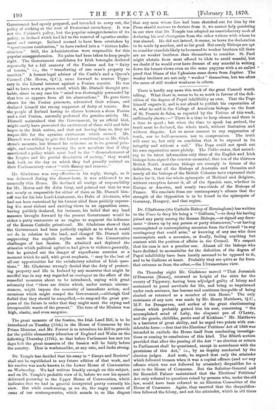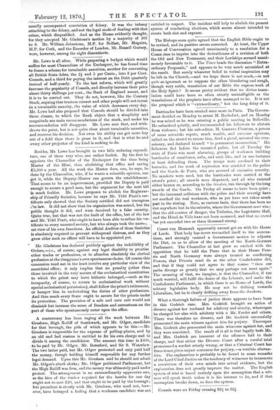On Thursday night Mr. Gladstone moved "That Jeremiah O'Donovan [Roasts],
returned as knight of the shire for the county of Tipperary, having been adjudged guilty of felony and sentenced to penal servitude for life, and being so imprisoned under such sentence, has become and continues incapable of being elected or returned as a member of this House." The only resistance of any note was made by Mr. Henry Matthews, Q.C., M.P. for Dungarvan, and author of the great electioneering climax which probably gained him his seat, concerning " the accomplished mind of Luby, the eloquent pen of O'Leary, and the gentle, childlike, poetic soul of Kickham." Mr. Matthews is a barrister of great ability, and he urged two points with con- siderable force :—first that the Elections' Petitions' Act of 1868 was intended to exclude the House itself from conducting investiga- tions or coming to conclusions of this kind. The fiftieth section provided that after the passing of the Act " no election or return to Parliament shall be questioned, except in accordance with the provisions of this Act," i.e., by an inquiry conducted by the election judges. And next, he argued that only the attainder which followed treason when it was a capital offence (and not any offence which was not followed by attainder) disqualifies for a seat in the House of Commons. But the Solicitor-General and Sir Roundell Palmer maintained that the Elections' Petitions' Act only referred to questions raised by persons who, under the old law, would have been referred to an Election Committee of the House of Commons. Again, they asserted that the disqualifica- tion followed the felony, and not the attainder, which in old times usually accompanied conviction of -felony. It was the infamy attaching to the felony, and not the legal mode of dealing with that crime, which disqualified. And so the House evidently thought, 'for they accepted Mr. Gladstone's motion by a majority of 301 to 8. Mr. William Johnstone, M.P. for Belfast, Mr. Maguire, M.P. for Cork, and the Recorder of London, Mr. Russell Gurney, were, however, among the eight dissentients.



































 Previous page
Previous page